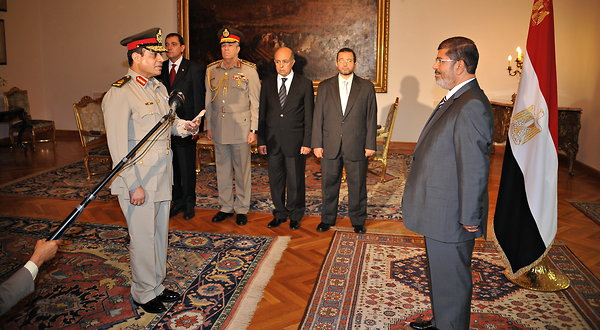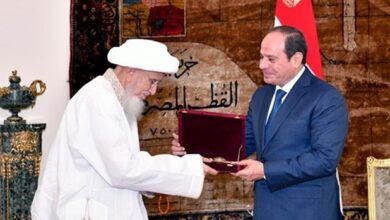
The Armed Forces, the Interior Ministry, and the Presidency made three official statements on 1 and 2 July. The presidency made its statement after calling off a press conference for "further deliberations."
The three statements make it apparent that the "people's will" is a central issue. The army and police spoke of the popular will voiced during the 30 June demonstrations, while the presidency referred to the people’s will demonstrated during the 25 January revolution.
The Armed Forces' 405-word statement, released at 4pm, put the people’s will front and center, referring to it 21 times, both directly and indirectly. It urged all concerned parties to bear responsibility for popular demands given "the historic circumstances the country is going through." Involving both explicit and implicit messages, the statement did not make any mention of the presidency, instead referring to "political groups."
It is likely that this was a message to the Muslim Brotherhood and other political players. "All" were granted 48 hours to respond to popular demands. It was understood that "all" included the presidency as well.
The army was explicit in terms of respect for the will of the rallying crowds. The most notable part of the statement, however, was the army spokesperson’s stance that the Armed Forces are party to solving the political issues, while simultaneously emphasizing that the military will not be involved in "politics and government."
This could be in reference to a political solution to be concocted by the roadmap the army intends to impose.
The wording used by the armed forces to explain its current and future role makes the institution a guardian of both the state's supreme principles and the republican system. It therefore bears no government responsibilities, such as being in charge of the state or the Cabinet.
The Armed Forces, instead, become a barrier in case political groups engage in disputes that endanger national security.
The statement apparently seeks to assure "all parties" that the suggested roadmap will not disrupt democracy, pointing to the Armed Forces' role "outlined in genuine democratic thinking and emanating from the people's will."
The message appears to be that the army's future role will not infringe on democratic practices, which include fair elections, freedom of expression, freedom of religion, and other components of contemporary democracy. At the same time, the Army maintains respect for the people's will, even if their demands are at odds with those who come to power democratically.
At 9:15pm, the Interior Ministry issued another statement that seemed to repeat the army’s statement. Its statement revealed that the country's top security institution was also biased toward the demands of the protesters hoisting "leave!" banners.
The police statement referred to "the people" eight times in various forms. The ministry introduced the forces as the "people's police," absolving itself from any past mistakes by stressing that the police "would never disappoint the great Egyptian people."
This self-vindication comes in line with other direct and indirect apologies made by the ministry during recent events, marking the beginning of a new era of a politically-neutral police service that "stands at an equal distance from all political groups."
The police statement aimed to deliver three messages: its solidarity with the army's stance, its commitment to securing protesters and facilities, and confirmation of its political impartiality.
At 1am, more than nine hours after the armed forces' statement was released, the presidency issued a 222-word statement that seemed to be totally detached from reality and which failed to mention the massive, nationwide, and heterogeneous protests taken place outside.
Instead, it referred to the president's recent speech in which he proposed national reconciliation and cited the gains made since the 25 January revolution (the most important of which is supposedly the election of Morsy as president).
The president spoke in generalities, stressing that "Egypt will absolutely not permit any step backward, whatever the circumstances."
The president’s statement exposed an absence of coordination between the president and the army, despite Morsy’s claim to the contrary in his last speech. The president accused the army of adding confusion to an already complicated political scene, but he did not voice specific objections to its statement, preferring instead to remain isolated from reality.
The writer is the head of Al-Masry Studies and Information Center. The analysis was written in Arabic and was translated by Mohamed Mostafa.




